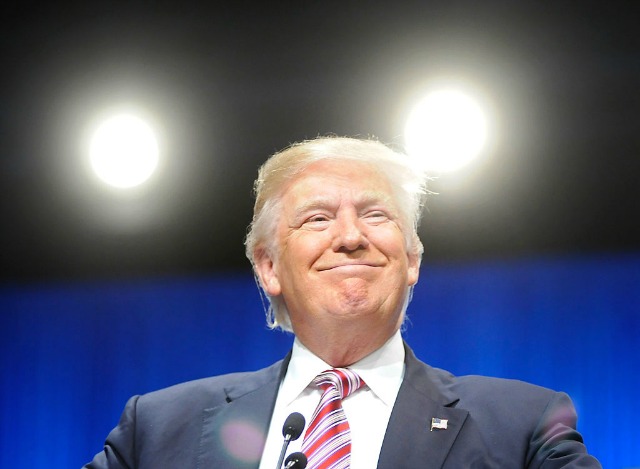Legal Scholar Explains Hamilton Electors' Hail-Mary Effort To Stop Trump
By Stephen Gossett in News on Dec 14, 2016 4:25PM

Donald Trump / Getty Images / Photo: Sara D. Davis
The presidential election has been over for more than a month; and the Electoral College is just a few days away from casting its own it’s i-dotting-t-crossing formalization ballot. But should they? The so-called Hamilton Electors argue that Donald Trump is exactly the kind of figure that the Framers had in mind when, in Federalist No. 68, Alexander Hamilton argued that electors should prevent a uniquely unqualified or susceptible-to-foreign-governments candidate from assuming office.
The movement calls for Republican electors to cast their votes instead for a moderate GOP alternative in hopes of throwing the decision back to the House of Representatives, which would potentially take the same tack. It seems like an extreme long shot. (Thirty-seven Republican electors would need to disavow Trump to tip the scales; only one has publicly); and it’s not without legal obstacles. But advocates, like Carolyn Shapiro, an associate professor at IIT Chicago-Kent College of Law and former Illinois Solicitor General, argue that the legal groundwork—and, just maybe, the logistical will—exists for such a possibility.
Chicagoist: Does Federalist 68 qualify in this situation?
Carolyn Shapiro: Federalist 68, in this current context, isn’t about electors saying, “Eh we don’t like who people voted for.” It lays out specific concerns, and it has become increasingly clear they’re the concerns we face: a lack of qualification, which we see in Trump’s refusal to take seriously intelligence briefings; the demagoguery, the division that he’s done nothing to address; and most concerning of all, the possibility of his being under the influence of a foreign power. We see that in his relationship with Russia, which at a minimum raises concerns. [The Russian interference] aided him. He’s consistently said very positive things about Vladimir Putin. And we had the Newsweek article which lays out the many ways in which Trump business interests leave him susceptible to pressure from foreign leaders—and not just Russia.

Carolyn Shapiro / Chicago-Kent College of Law
CS: I don’t know what that means. It’s extraordinary, unprecedented, and unusual. It’s not what anybody would have expected when they signed up to be electors. It’s all of those things—no question. But it’s not being done for any glory. The people engaged in this effort—the electors who’ve come forward and to the extent that more are considering coming forward—are doing something not likely to endear themselves to their own party. So I don’t know why the judge would call it that.
C: Is it logistically possible? Can they get the needed 37 electors?
CS: I think it’s really impossible to know that right now. 37 is slightly more than 10 percent of the total number of Republican electors. When you think about it that way, it’s not a particularly large proportion. The majority of Republican electors, I assume, are not interested in pursuing this, but there’s been so much that’s happened since November 8—information the electors have that the people didn’t have. If I were a Republican elector I would be very nervous about going public, so the fact that we only have one person who’s come out and said he’s definitely not voting for Donald Trump doesn’t tell us much about what will ultimately happen. I just don’t think we can know right now.
C: What kind of legal repercussions do Hamilton Electors face?
CS: 21 states have no restrictions. Some states impose fines and civil penalties. A small number of states criminalize it—mostly misdemeanors, but at least one categorizes it as a felony. Then there are several states that not voting for who they’re supposed to will be deemed a resignation. Those statues, in my opinion, are unconstitutional. They inject states into a process that the Constitution gives them no role in. I don’t know yet if there will be more [legal] challenges. If there were to be 37 electors, I don’t know whether it would be necessary to make more challenges. In states with civil and criminal penalties, those can be challenged after the fact. Electors can do what they believe is correct and fight the fight later. It’s a risk, but it’s an option.
C: If by some long shot, the election were thrown into the House, how do you see that playing out?
CS: At that point it becomes even more unpredictable. In my view, the most likely outcome would be the election of a Republican other than Trump. The second most likely outcome would be Trump. But if there were that kind of vote of no confidence from Republican electors, at genuine risk to their own safety, I think that would carry some hefty. Plus already we’re seeing real tension between Trump and GOP congressional members. If there were a candidate around which Hamilton Electors coalesced, then there’s a pretty good shot that person would be chosen by the House.
C: Is there a consensus candidate?
CS: I'm not aware of any consensus since Im not privy to any internal discussions that electors may or may not be having. I know what names have been thrown around: John Kasich, Mitt Romney, Colin Powell, John McCain. But I couldn’t tell you what specific conversation electors are having.
C: If this failsafe itself fails, is the Electoral College outmoded? Do you envision any way the presidential election could be changed to a popular vote?
CS: The most likely way is through the National Popular Vote Interstate Compact, which a number of states have already enacted. It’s an agreement that, if enough other states sign on, a state will assign its electors to whoever wins the popular vote. From my perspective, there’s nothing in the Constitution that would prevent that. The Constitution allows the state legislature to decide how to appoint electors. So there’s nothing stopping a state from appointing electors who reflect the national popular vote. There’s also talk of lawsuits challenging the winner-take-all structure of the Electoral College. That structure is not mandated by the Constitution. We’re all used to it and tend to think that’s just how it is. But it doesn’t have to be that way, and there are compelling arguments for changing that. But in terms of a constitutional amendment to change the Electoral College, I think we’re pretty far away from that.
Related stories:
Could An Electoral College Revolt Stop Trump?
The Electoral College Now Has A Moral Responsibility To Vote For A Trump Alternative